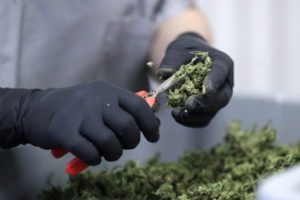WSU researchers team with Puyallup tribe on medicinal cannabis research

SPOKANE — Researchers at Washington State University are teaming up with the Puyallup Tribe of Indians in an effort to chart the tribe’s outcomes prescribing medicinal marijuana to patients.
The partnership between the land grant institution in Pullman and the Tacoma-based native tribe is intended to create a standard to evaluate treatment plans at a natural healing clinic the Puyallups opened in October, and to determine the effectiveness of the drug as an alternative to opioids in managing pain.
“We’ll hand them an iPad, and ask them to fill out a couple quick surveys,” said Michael McDonell, chair of WSU’s Collaboration on Cannabis Policy, Research and Outreach. “Some of the outcomes we’re interested in looking at, is what kind of cannabis are they using? What effect is it having on their pain or well-being, and their quality of life?”
The Puyallup tribe has staked several claims in the state’s legal marijuana industry, opening two recreational stores in the Tacoma area. One opened its doors last month with celebrity guests Cheech Marin and Tommy Chong, the comedians responsible for several stoner-inspired comedies of the 1970s and 1980s. The clinic is named “Qwibil,” a native word for fixing one’s self mentally, physically or spiritually, and is in the tradition of the Puyallup people, said its chairman.
“From time immemorial, the Puyallup have practiced traditional healing,” said Bill Sterud, chairman of the Puyallup Tribe of Indians, in a news release from WSU announcing the team-up. “This partnership with WSU and Qwibil will help us research the safety and efficacy of cannabis as medicine for our patients’ use.”
The clinic serves native and non-native patients, according to the news release.
McDonell said research institutions are limited in their access to cannabis users by federal laws that could affect funding. The partnership will allow researchers at the university to gather data that can be used to develop treatment strategies based on strain, the effectiveness of cannabidiol in treating pain and other disorders and the method of delivery, be it smoked or ingested, McDonell said.
“They’re in a unique space,” McDonell said of the Puyallup tribe. “They want to know the answers, and they want to be doing something that’s positive for the community.”
McDonell said he was approached by the tribe to work with them following a presentation at an addiction conference. Research into the effectiveness of medicinal marijuana has been hindered by the federal government’s classification of marijuana as illegal in all instances under drug enforcement laws. Bills have been repeatedly introduced in Congress to end that classification, as more and more states move to legalize the drug for recreational and medicinal purposes and lawmakers push for other reforms, including allowing pot businesses access to banking services.
Collecting patient data is an important step in legitimizing cannabis as a potential therapeutic drug, said Debbie Churgai, interim director for the national group Americans for Safe Access, which pushes for reform of marijuana laws to allow for medicinal uses. While there are methods available for collecting that data, including a smartphone app called “Releaf,” there are still patients who are wary of sharing information, even anonymously, due to federal laws, she said.
“This medicine has grown on people telling stories of how it helped them,” Churgai said. “We’re finally at that point where we need to actually put these stories into something quantitative, and look at the numbers and see how it really is affecting people.”
Jake Felice, a naturopathic medicine practitioner who consults for cannabis businesses in Washington state seeking medicinal approval, said any data collection system for patients should be far-reaching. The role or roles of the body’s endocannabinoid system, which interacts with the chemical compounds in marijuana, is not yet completely understood and many of the effects of those chemical interactions remain unknown.
“We are dealing with a very new system that’s extremely important biologically, that we hardly know anything about,” Felice said. “It’s like we just discovered a new ocean, and it’s time to go and explore.”
The tribe is scheduled to fund the research project for a year. McDonell said he hopes enough patients will submit their health data so that the research team can begin to develop theories about successful medical marijuana treatment plans, leading to more grant funding and a greater understanding of the drug’s potential therapeutic effects.
“We need a good chunk of people,” he said. “We’re hoping it’s an ongoing effort.”
